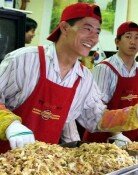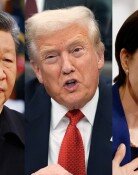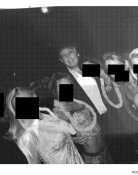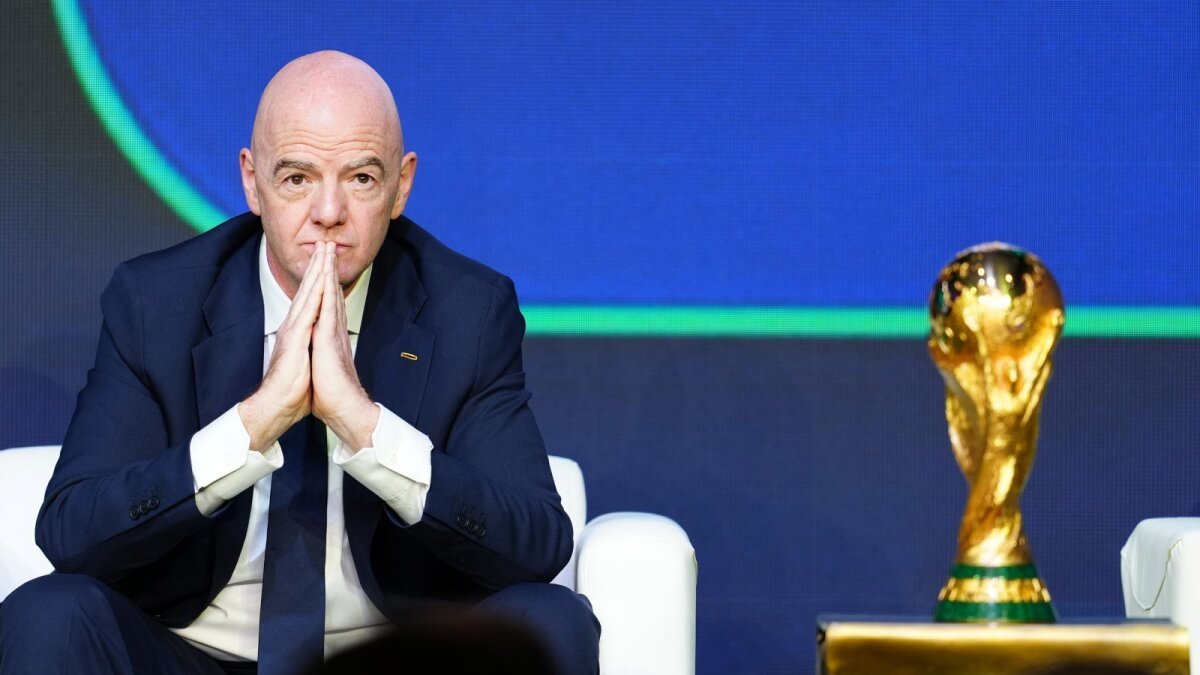Interview with Buddhist priest Hyungak
Interview with Buddhist priest Hyungak
Posted October. 25, 2000 12:20,
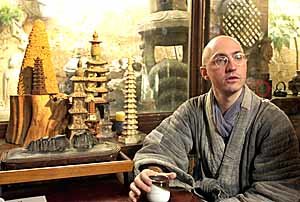
Buddhist priest Hyun-Gak, 36, whose secular name is Paul Muensen, as a student found old pair of blue jeans and shirts, the garb of choice, and showed up at the appointed caf? in Insa area of Seoul, wearing a worn-out patched-up Buddhist robe. It wasn't that he lacked a spanking new robe presented to him by the over-solicitous Buddhist reverends, but rather, he found his tattered robe more to his comfort.
I've heard you will be secluding yourself in the meditation grotto soon.
(As if on cue, the cell-phone makes a loud protest for attention. I had forgotten to turn the device off.)
"If you use the phone very often, you need to recharge it. As I've traveled to various places to preach Buddhism, I've overused my tongue, which drained all my energy. I will attend the 'goodbye party' at Hwa-gye Monastery on Oct. 29 and head for a hermitage in the mountains and recharge myself through a hundred-day solitary meditation in complete silence."
I've also heard you had an extremely busy preaching schedule.
"This week is completely full, at the Seoul Joong-lang Ward Office on Oct. 23, Chungnam National University on Oct. 24, Baejae University on Oct. 25, Taejon University on Oct. 26, Kyungpook National University on Oct. 27 and at the Chokye Monastery on Oct. 28."
(After a summer of rest and relaxation, he traveled to the U.S. and visited major cities such as New York, Washington and Los Angeles to preach to the new generation of Korean-Americans for a month. Back in Korea, his exhausting tour leaves him not a single day for rest.)
"There really isn't anything special about me. For some time Koreans have preferred the American things, and they have forgotten the importance of what they already had. Many of the Hollywood stars including Richard Gere, Meg Ryan and Tom Cruise have great interest in Buddhism. When a Korean tells other Koreans not to forget their Korean heritage, they don't listen, but when a Westerner tells them the importance of it, it seems they are more open."
Did Rev. Seung Sahn ask you to cut down on your schedule?
"Last year, soon after the publication of The Act of Brutality -- From Havard to Hwa-gye Monastery, the head reverend, concerned about my welfare, suggested I should escape from the city of Seoul. It is difficult living in Korea. When some influential reverends ask me, "Come and preach!" I have no choice. When they say to me, "Help me! Help me!", I can't turn the other way. I can't escape. I am fond of Korea, and I simply want to help Korean people.
(His inability to refuse the requests by his seniors hints at how much of a Korean he has become. Actually, he believes he was a Korean in his previous life.)
When I hear the Christians preaching their creation theory and when the Buddhists preach about the previous life, I cannot but wonder how they could utter such things while living in this modern world.
"The previous life doctrine isn't a Buddhist teaching. It existed prior to the coming of Buddha. It's what is called 'cause and effect.?Let us suppose all the lights in this caf?were off. When a ball is thrown from over there, the light switch goes up automatically. We would then see the ball in midair. Almost instantaneously, we would know where the ball came from and where the ball is headed without needing to give much thought, it is an automatic response. Our previous, the present, the future lives are much the same."
(Lifting his arm, he pretends to be throwing a ball, then moves to the side and makes a catch of the invisible, non-existent ball. He is indeed an American with a flair and ease in use of gestures.)
(I met the Rev. Soong-San about a week ago while on an assignment at Mount Keumkang. He had brought an entourage of foreign monks for a visit to the mountain. Rev. Soong-San has seven officially recognized legal disciples. It is a bit odd that all of them are foreigners.)
Why doesn't Rev. Soong-San instruct Buddhism to a Korean?
"The head reverend, when he was living in Pyongyang, lived in a house with a large orchard. He knows well that an old tree cannot bear much good fruit. The Korean Buddhist tradition has grown too old. The Korean monks know so much and so well, I believe the head reverend feels they can't easily accept the 'only don't know mind.' They can't seem to accept the simple and fresh experiences."
By the way, when will the collection of Buddhist text by Rev. Soong-San, the Compass of Good, be published in Korean?
"It will be out in about one and half month. Originally, the book was published as The Compass of Zen. It was very popular. It's a collection of sermons by Rev. Soong-San given in his 'Kimchi English.' Translating them into Korean was extremely difficult, as the very unique style and mood of the book was hard to translate."
(Like myself, Buddhist monk Hyun-Gak was born in 1964, and still in his 30s. I asked about his desires and ambitions.)
What do you do about your desire for money or sex?
What do you do about your materialistic or carnal desires?
"At my age, it is natural to have them." (I was stunned!)
"Money or sex themselves are neither good nor bad. They exist as they are. The question is how attached you are to them and how much you are controlled by them."
Do you feel lustful when you see a woman you like?
"I am also a human being."
(What have I got to lose?) Just as Rev. Soon-San so often preaches, "When you drink, you drink and that' it, when you eat, you eat, nothing more," what would happen if you simply "did it" and thought nothing of it?
(Laughing) "I am also human. I have nothing more to say other than that. Please, have a drink of your tea."
(Long ago, there lived a Zen priest by the name of Jo-ju. He faced a visitor who asked him, "What is the 'divine' truth?" I am reminded of the Zen master's answer, "Come and drink your tea.")
Song Pyoung-In pisong@donga.com



